The Mauritanian government intends to defend the bill on political parties as a way to modernise the
political landscape and strengthen democracy but the opposition has denounced it as a mirage.
It accused the government of an attempt to lock the political system in favour of the status quo.
On Wednesday, December 25, 2024, the Council of Ministers of Mauritania, chaired by Mohamed Ould Cheikh
El-Ghazouani, adopted a series of legislative measures, including the bill amending certain provisions of Ordinance No. 91-024 of July 25, 1991, governing political parties. While this reform aims to further
structure the country’s political landscape, it has triggered waves of criticism within the opposition, national editorial offices, and social networks, where the project is described as a “slaughterhouse” reform by some observers. This text, which aims to modernise and strengthen political parties in Mauritania, is far from unanimous, both because of the conditions it imposes for the creation and operation of political parties, and the sanctions it provides for in the event of non-compliance with its provisions.
The bill profoundly modifies the regulations on the creation and operation of political parties in Mauritania. One of the first notable changes concerns the conditions for creating a party. The text provides for an increase in the number of founding members of a political party, which goes from 20 to a minimum of 150 members,
representing all the wilayas of the country.
According to the government, this measure aims to guarantee broader representation and better structuring of the parties.
In addition, the bill requires that a party program be sponsored by 5,000 citizens spread across half of the wilayas, with a minimum of 10% of signatures per wilaya, and a requirement of 20% of women among the signatories.
These new conditions, while aimed at strengthening democracy and inclusion, are seen by some as a subtle way of controlling the emergence of new political forces.
One of the most controversial points of this reform is the requirement for political parties to open seats in at least half of the wilayas within six months of obtaining approval. This measure could prove problematic for parties from civil society or those that do not have the resources to establish themselves quickly throughout the
territory.
Public funding and party dissolution
The bill also modifies the criteria for access to public funding. The threshold required for a party to be eligible for public support increases from 1% to 2% of the votes cast in the most recent general municipal elections. This increase in the threshold is seen by some as a major obstacle to the survival of emerging political parties,
particularly those in the opposition, which often struggle to obtain a sufficient percentage in these local elections.
In terms of party dissolution, the text introduces particularly harsh provisions. A party that does not respect the operating conditions, or that fails to obtain 2% of the vote in two successive general municipal elections, may be dissolved. In addition, a party that presents candidates in these elections and does not obtain this threshold is also threatened with dissolution. Dissolved parties cannot reconstitute under another name for five years, a measure that raises concerns about the possibility of political repression.
For the opposition, this bill resembles a maneuver to stifle political diversity in Mauritania. According to several opposition figures, the new conditions for the creation and operation of parties are designed to favour parties close to power, in particular the INSAF party, to the detriment of smaller political groups that are often more critical of the government. The latter accuse the government of wanting to reduce the political space in Mauritania by imposing conditions for obtaining approval that they consider excessively restrictive. National media, particularly on social networks, quickly seized on this reform to fuel the debates. Hashtags denouncing this “slaughterhouse reform” invaded online platforms, with publications calling for mobilization against a
bill deemed contrary to democratic principles. Supporters of the reform, for their part, claim that it simply aims to clean up political life, avoid “phantom” parties and promote true political pluralism.
The weapon of party suspension
One of the most controversial aspects of the reform is the possibility of suspending a party in the event of threats to public order. If a party is found responsible for disturbances or violence, it can be suspended for a period of 90 days. A measure that, according to some observers, could be used arbitrarily to stifle dissenting voices. The
possibility of prolonged suspension and dissolution in the event of non-compliance with the rules further reinforces this perception of increased government control over political parties.
The reform seems particularly unfavourable to opposition political parties. Many opposition leaders are concerned about the impact of these new provisions on political plurality and the representation of dissenting voices. Some believe that these new rules are primarily aimed at eliminating parties that could represent a real alternative to the government in power, thereby weakening democracy in Mauritania.
However, critics point out that the bill could lead to a concentration of power in the hands of the government and its allies, making it even more difficult for opposition political parties to exist and grow.
Political parties that do not have the resources to meet the new requirements risk being excluded from the political game.
MK/te/Sf/fss/as/APA


